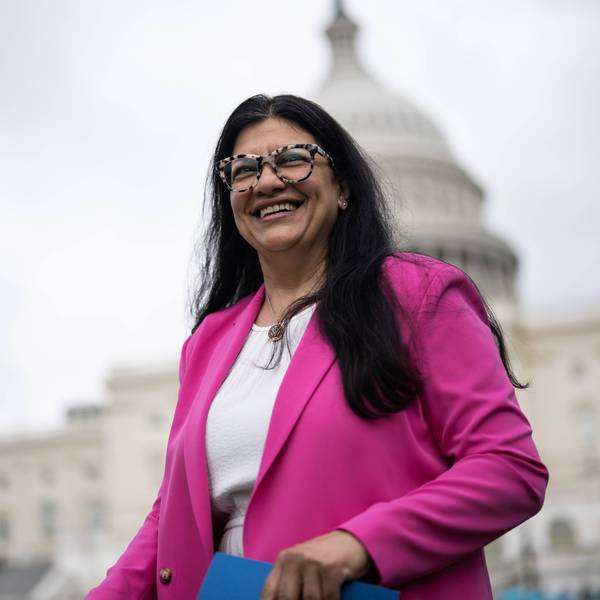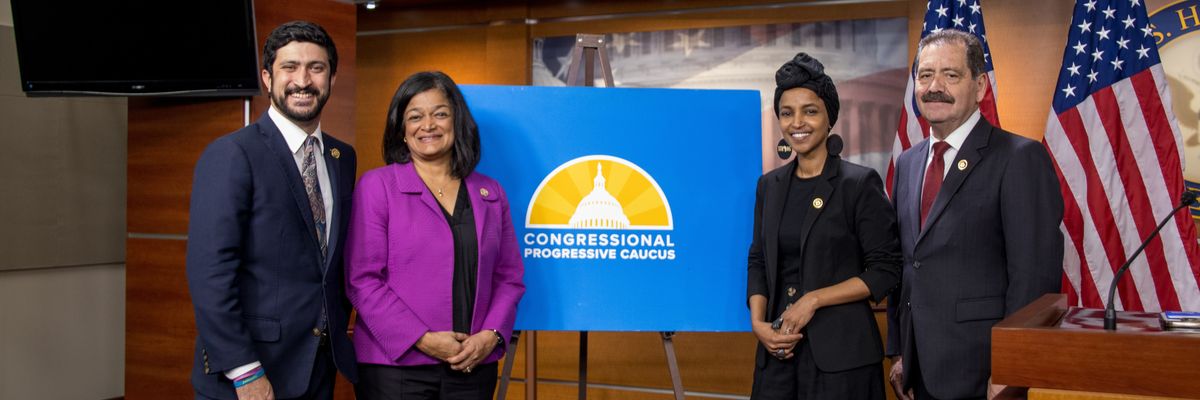The Congressional Progressive Caucus on Thursday elected its leaders for the next term, including Rep. Greg Casar as chair.
"The members of the Progressive Caucus know how to fight billionaires, grifters, and Republican frauds in Congress. Our caucus will make sure the Democratic Party stands up to corporate interests for working people," said Casar (D-Texas), who will replace term-limited Rep. Pramila Jayapal (D-Wash.).
"I'm honored to build on the legacy of Chair Jayapal," Casar continued. "I've fought back against extremist, egocentric autocrats in Texas for my entire adult life. The Democratic Party must directly take on Trump, and it'll be CPC members boldly leading the way and putting working people first."
Casar, who is currently the CPC whip and ran unopposed, will be joined for the 119th Congress by Reps. Ilhan Omar (D-Minn.) as deputy chair and Jesús "Chuy" García (D-Ill.) as whip.
"The Congressional Progressive Caucus has always served as an incredible vehicle for transformative change, justice, and movement building," noted Omar. "I am honored to have the support of my colleagues to serve another term as the deputy chair of the Progressive Caucus. Over the next term, we are going to fight to build an inclusive movement that meets the moment."
García said that "I am proud to join incoming Chair Casar, Deputy Chair Omar, and all members of the newly elected executive board as we prepare for the 119th Congress—in which I believe the role the CPC plays will be more critical than ever."
"We are a caucus that gives platform to ideas deeply popular across the political spectrum, and a caucus that builds diverse coalitions to get things done," he continued. "I look forward to working with my colleagues in Congress and partners across the country who believe in people-centered policies rooted in equity and justice for all."
The CPC, first led by Sen. Bernie Sanders (I-Vt.) in 1991, when he was still in the U.S. House of Representatives, has nearly 100 members. The new caucus leaders are set to begin their terms on January 3 and will face not only a Republican-controlled House and Senate, but also U.S. President-elect Donald Trump, who is set to be sworn in on January 20.
"It is my great honor to pass the torch to the next class of elected leadership of the Progressive Caucus: My dear friends and trusted colleagues Reps. Greg Casar, Ilhan Omar, and Chuy García," said Jayapal.
"I was proud to establish term limits when I became chair in 2018, and have full confidence in the abilities of our new class to lead this caucus in the fight against the worst of the incoming Trump administration while rebuilding our party with a focus on economic justice for working people," she added. "I will be cheering these three new leaders and our new vice chairs at every turn as chair emerita come next year, and my heart is very full knowing we will have them at the helm of the CPC."
Speaking with NBC News on Wednesday, 35-year-old Casar said that "the progressive movement needs to change. We need to re-emphasize core economic issues every time some of these cultural war issues are brought up."
"So when we hear Republicans attacking queer Americans again, I think the progressive response needs to be that a trans person didn't deny your health insurance claim, a big corporation did—with Republican help," he explained. "We need to connect the dots for people that the Republican Party obsession with these culture war issues is driven by Republicans' desire to distract voters and have them look away while Republicans pick their pocket."
According to NBC:
That means the Democratic Party needs to "shed off some of its more corporate elements," to sharpen the economic-populist contrast with Republicans and not let voters equate the two parties, he said. He predicted Trump and the Republican-led Congress will offer plenty of opportunities to drive that distinction, including when it pursues an extension of tax cuts for upper earners.
"The core of the Republican Party is about helping Wall Street and billionaires. And I think we have to call out the game," Casar said. "The Democratic Party, at its best, can hold people or can have inside of its tent people across geography, across race and across ideology. Because we're all in the same boat when it comes to making sure that you can retire with dignity, that your kids can go to school, that you can buy a house."
Others—including Sanders, who sought the Democratic nomination for president in 2016 and 2020—have issued similar calls since Democrats lost the White House and Senate in last month's elections.
"In the recent elections, just 150 billionaire families spent nearly $2 billion to get their candidates elected," Sanders said Saturday. "Our job in the coming months and years is clear. We must defeat the oligarchs and create an economy and government that works for all, not just the few."
On Thursday, both Sanders and Jayapal, who have led the congressional fight for Medicare for All, reiterated calls for a single-payer healthcare program in response to a social media post by Elon Musk, who is set to co-lead Trump's forthcoming Department of Government Efficiency with fellow billionaire Vivek Ramaswamy.




